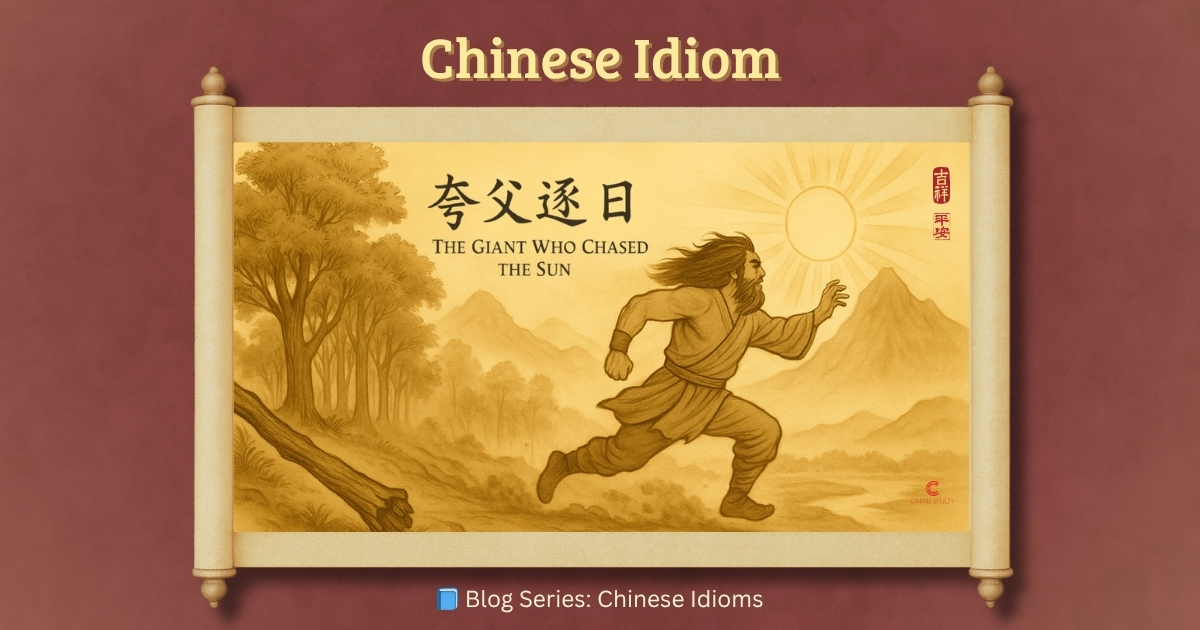🌞 夸父逐日 kuā fù zhú rì – The Giant Who Chased the Sun

🔍 What It Means
夸父逐日 (kuā fù zhú rì) literally means:
“Kua Fu pursues the sun”
Word-by-word breakdown:
- 夸父 (kuā fù) – Kua Fu, a giant in Chinese mythology
- 逐 (zhú) – to pursue, to chase
- 日 (rì) – the sun
This idiom describes someone who has incredible determination and dares to chase a goal that seems impossible — even if it’s risky or dangerous.
In English, it’s like saying:
- ☀️ Chasing the impossible
- 🏃♂️ Running toward a dream
- 🔥 Burning with unstoppable ambition
🏺 Where It Comes From
This idiom comes from the ancient Chinese myth of 夸父逐日 (kuā fù zhú rì) — the story of a giant named Kua Fu who dared to chase the sun.
Kua Fu lived in the far north, where his tribe endured freezing temperatures.
Without enough sunlight, the land was cold and dark.
Many of his people froze to death in the endless night.
Kua Fu couldn’t bear to see his tribe in pain.
He made a bold decision:
He would chase the sun, catch it, and bring light and warmth to his people.
So he ran.
With mighty strides, Kua Fu began pursuing the sun across the sky.
The earth cracked beneath his feet. The air shimmered with heat.
He became extremely thirsty — but still, he did not stop.
He drank from the Yellow River and the Wei River, but it wasn’t enough.
He turned toward another spring…
but collapsed from exhaustion before reaching it.
Yet even in his final moment, Kua Fu didn’t give up.
He threw his walking stick forward with all his strength.
It landed far away and transformed into a vast forest —
a place full of shade, trees, and water,
so that future travelers would never suffer like he did.
That is the story of 夸父逐日 (kuā fù zhú rì).
It became a symbol of great ambition, self-sacrifice, and fearless pursuit of hope.
Kua Fu never reached the sun,
but he left behind a path of courage for others to follow.
💬 How to Use It
Use 夸父逐日 (kuā fù zhú rì) to describe someone chasing a huge, difficult, or even “impossible” goal with heroic determination.
❌ Not for casual effort
✅ Often used in motivational or poetic language
✅ Describes people with unyielding courage
✅ Common in literature, speeches, or to praise dreamers
🎯 Real Examples
1.
他就像夸父逐日一样,坚持到底,不怕失败。
(Tā jiù xiàng kuā fù zhú rì yíyàng, jiānchí dàodǐ, bú pà shībài.)
👉🏻 He’s just like Kua Fu chasing the sun — never giving up, never afraid of failure.
2.
我们要有夸父逐日的勇气,为梦想努力到底。
(Wǒmen yào yǒu kuā fù zhú rì de yǒngqì, wèi mèngxiǎng nǔlì dàodǐ.)
👉🏻 We need the courage of Kua Fu pursuing the sun — to fight for our dreams to the end.
⚠️ Common Mistakes (Watch Out!)
❌ Mistake: Using 夸父逐日 (kuā fù zhú rì) for everyday tasks or small challenges
✅ Correct: This idiom is for huge dreams and heroic effort
❌ Mistake: Thinking the story is just about failure
✅ Correct: It’s about the spirit of striving — success is secondary to the bravery of the pursuit
💡 Memory Tip
Imagine standing on a mountain at sunrise.
Everyone tells you: “You can’t catch the sun.”
But you start running anyway — across rivers, through deserts, toward the light.
Even if you fall, others will walk in your footsteps.
That’s 夸父逐日 (kuā fù zhú rì) — not about reaching the sun, but having the courage to chase it.
🧩 Interactive Practice
Translate this sentence into English:
- 他有夸父逐日的精神,总是追求最远大的目标。
Answer:
He has the spirit of Kua Fu chasing the sun — always aiming for the greatest goals.
🌟 Final Thoughts
夸父逐日 (kuā fù zhú rì) teaches us that some dreams are worth chasing — even if they seem too far.
Because it’s not about reaching the sun, but having the courage to run toward it.
What’s your “sun”? ☀️
What would you run toward if you weren’t afraid to fall?
🏮 One story ends, but many more await…
👉 Stay tuned for the next idiom in this series!
Thank you for subscribing!
Have a great day!